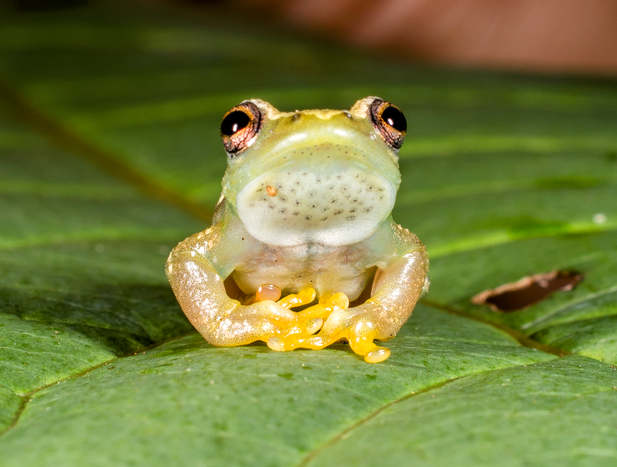
Voiceless frog recently discovered in Africa
A team of researchers led by the University of Cincinnati (UC) has recently discovered a new species of frog in Tanzania’s Ukaguru Mountains. The Ukaguru spiny-throated reed frog (Hyperolius ukaguruensis) has a distinct feature: it is among the few species of frogs in the world that do not vocalize at all. Belonging to a group of “spiny throated” reed frogs, it is characterized by the presence of tiny spines on the male’s throat, which the frogs use to recognize other members of their species.
“It’s a very odd group of frogs,” said study lead author Lucinda Lawson, a conservation biologist at UC. “The male frogs don’t call like most other frogs do. We think they may use the spine as something like Braille for species recognition. “Without a call, they need some other way to recognize each other.”
H. ukaguruensis belongs to a family of nearly 200 species in the genus Hyperolius. According to the experts though, it may be significantly different from other species from this genus. “With any Hyperolius, I can probably tell by looking at it whether it’s new or potentially new,” Lawson explained. “Immediately it was clear that it was a spiny-throated reed frog. But this one was a golden, greenish brown instead of the green color found in the other species. Sometimes color variation doesn’t mean anything, but it might here.”
A combination of genetic and genomic analyses confirmed that this frog was distinct from other members of Hyperolius, while measurements shown that it had unique body proportions, with smaller eyes in relation to its head than other spiny-throated reed frogs.
As many of its relatives, H. ukaguruensis is a critically endangered species and should thus be considered of high conservation concern, particularly since amphibians are highly susceptible to human impacts, such as deforestation. “If a bird’s habitat is destroyed, they sometimes can fly to a new forest. But that’s hard for amphibians,” Lawson said.
Conservation measures are highly important because having a diversity of species is crucial to maintain healthy ecosystems. “We think about this question a lot: why does one species matter?” Lawson said. “If this one species goes extinct, nothing much happens. We just lose one more strand in the fabric of the ecosystem. But if you keep pulling out strands, the ecosystem becomes destabilized and the fabric unravels,” she concluded.
The study is published in the journal PLoS ONE.
Image Credit: Christoph Liedtke
—-
By Andrei Ionescu, Earth.com Staff Writer
Check us out on EarthSnap, a free app brought to you by Eric Ralls and Earth.com.












